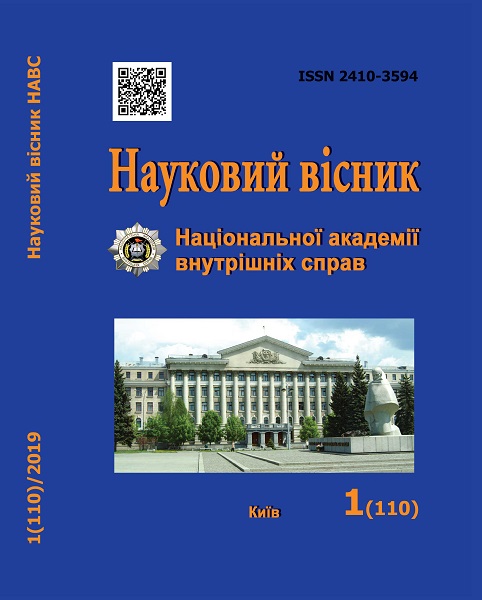Criminological Characteristics of the «Professional» Crime: Social-Legal Research
Abstract
The formation of civil society and the development of Ukraine as a legal, democratic and social State are
associated with the large-scale legal reform, comprehensive strengthening of the rule of law, protection of the
constitutional rights, freedoms and legitimate interests of a person and citizen. The public security and rule of law are recognized as very important factors in the development of the Ukrainian society. However, ensuring social security is impossible without creating the safe space for people and protecting their basic human rights and freedoms from criminal encroachments. One of the basic means of ensuring security is the use of the criminal punishment in the form of
imprisonment. However, the statement about the effectiveness of that measure is still quite controversial. It has long been recognized at the level of the international community that places of deprivation of liberty do not contribute to the prevention of recidivism, which is one of the most dangerous types of crime and is closely linked to the professional, organized and «white-collar» criminality and can be demonstrated in various forms. The conditions of the deprivation of liberty are characterized by considerable negative consequences, including the increase of the «professional»
qualification of the imprisoned offenders and hindrance to the process of their return to the open society
(re-socialization). At present, more and more scientists say that the most efficient measures are the non-punitive
sanctions and the individual corrective work as the prevention of the criminal «professionalism». More attention is being paid to the alternative forms of punishment and the development of the Probation Service’s activities. But the
«professional» crime is a complex and multicomponent phenomenon. Therefore, its combating and prevention require the development of the common approach and significant reform of the criminal and criminal-executive legislation, as well as the change of the sanctions policy vector of the State from the punitive to the correctional one. Besides, it is
necessary to make the comprehensive social-legal research, which determines the relevance of that topic and
encourages scientists to further researches. Therefore, the purpose of our research is the comprehensive examination of issues related to the «professional» crime and to the impact of the punishment on its development. The research is
carried out on the basis of the sociological survey (questionnaire) of the persons, who have committed crimes with the signs of the criminal «professionalism», as well as on the basis of the generalization of the obtained information about the criminological features of the «professional» crime and on the basis of the proposals on the prevention of the
«professional» crime. The methodological basis of the research is the set of general scientific and special methods of the scientific cognition, which give the possibility to analyze comprehensively the range of issues related to the formation, development and prevention of the «professional» crime. The theoretical basis of the research is the Constitution of Ukraine, the Criminal and Criminal-Executive Codes of Ukraine, the Law of Ukraine «On probation», the current
legislative, normative acts and draft normative acts, which regulate relations in the sphere of execution of punishment and serving criminal sentences, as well as the scientific articles on that topic. The analytical method was used for
analyzing the results of the questionnaire of those persons, who committed crimes with the signs of criminal
«professionalism». The method of the statistical analysis gave the possibility to examine in detail the results of the
questionnaire in each section. The legal-comparative method gave the possibility to compare those results according to certain criteria. Therefore, the article reveals not only the respondents opinion through the posed questions, but also follows the relationship of the responses, depending on different factors. In addition, the method of legal prediction gives the possibility to continue the researches of the above mentioned issues on the basis of the obtained earlier results. As a consequence, the results would be implementated in the legislation for the «professional» crime prevention.
Keywords: professional criminality; criminal professionalism; criminal offense; criminal qualification; criminal
subculture; features and determinants of the «professional» crime.
Downloads
Abstract views: 144 PDF Downloads: 168
- Authors reserve the right to authorship of their own work and transfer to the magazine the right of the first publication of this work under the terms of the Creative Commons Attribution License, which allows other persons to freely distribute published work with mandatory reference to authors of the original work and the first publication of an article in this magazine.
- Authors have the right to enter into separate additional agreements on non-exclusive dissemination of the work in the form in which it was published in the journal (for example, to post an article in the institution's repository or to publish as part of a monograph), provided that the link to the first publication of the work in this journal is maintained.
- The journal's policy allows and encourages the posting of articles by authors on the Internet (for example, in electronic storehouses of institutions or on personal websites), both before the submission of this manuscript to the editorial office and during its editorial processing, as this contributes to the creation of a productive scientific discussion and positively affects the efficiency and dynamics of citing the published work.




